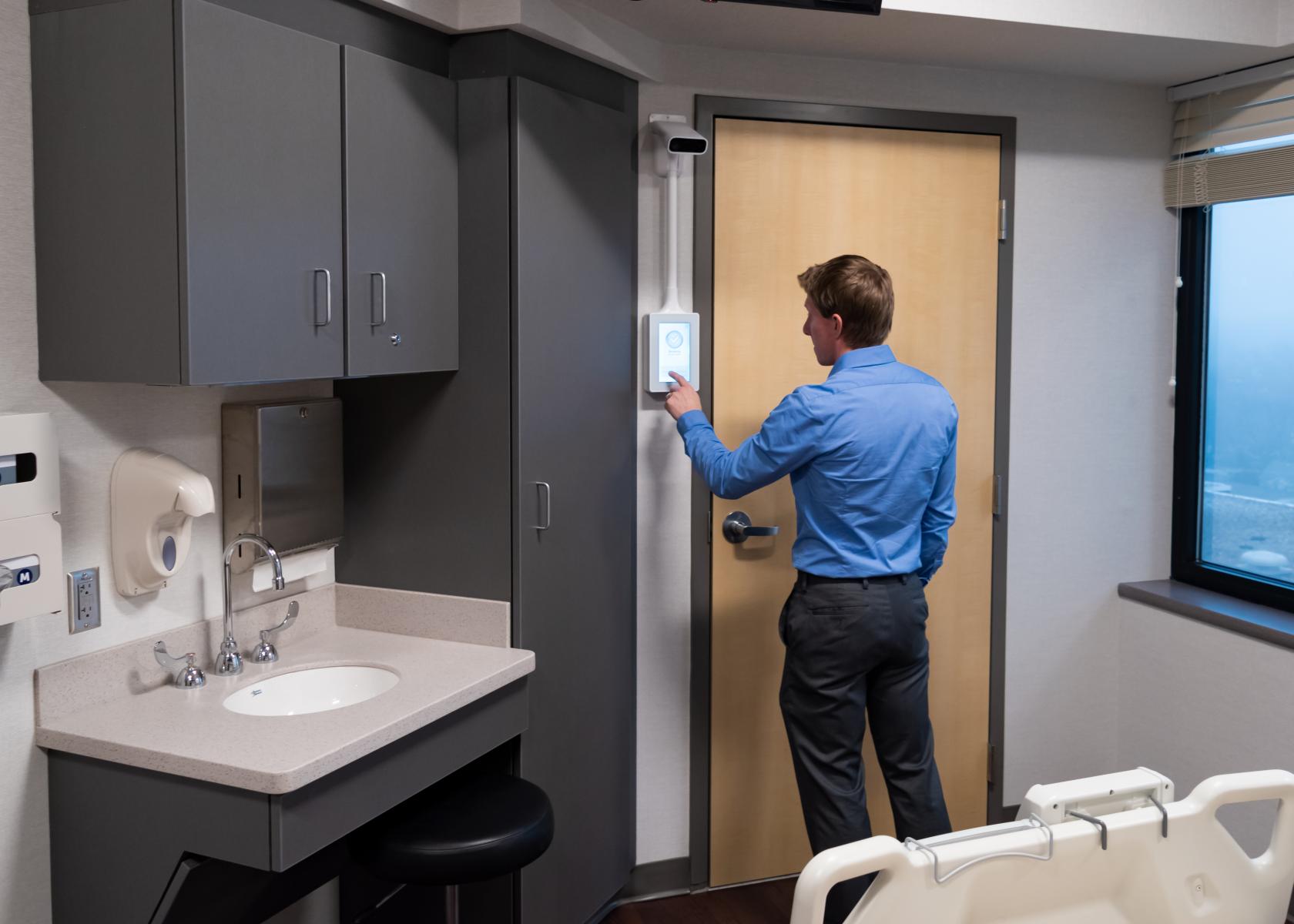
Lucas Sabalka uses the Ocuvera system at Bryan Health in Lincoln. Ocuvera is lending a camera’s eye view on protecting hospital patients, with the goal of fall prevention. Dr. Sabalka's job is to teach a computer how to monitor a patient and automatically detect when the patient is doing something that might increase their risk of falling.
By employing machine learning, computer visioning, and algorithms, Nebraska alumnus Lucas Sabalka gives the gift of time to the medical field through his work at Ocuvera, a Lincoln-based Nebraska Global company.
Inspired from the Latin for "true eye," Ocuvera is lending a camera's eye view on protecting hospital patients, with the goal of fall prevention.
"We use the camera to see the patient, and my job is to teach the computer how to monitor the patient, how to watch the video stream, and automatically detect when the patient is doing something that might increase their risk of falling,” said Sabalka, who graduated in 2002 with degrees in mathematics, computer science, and history from the University of Nebraska–Lincoln. "Getting the mathematics behind those algorithms correct" is at the heart of his work, he added.
The end result of training machines to predict patients' movements is an increased capability to have patients monitored 24/7 in a way that human monitors are not able to provide. When a nurse might need to step away to take care of other patient concerns, a computer is still able to maintain the patient oversight, freeing up the nurse to handle other tasks as they occur.
Working with Bryan Health hospitals, Ocuvera began data collection and recording in 2014 and has since gathered and analyzed data recording footage totaling around 200,000 hours. "That’s about 23 years when played back-to-back," said Sabalka, who received his Ph.D. in mathematics from the University of Illinois Urbana-Champaign in 2006.
In 2016, Ocuvera was able to begin working with the hospital to send alerts to nurses through the Ocuvera camera and monitoring system. The initial focus is on medical surgical units in hospitals, but the company hopes to expand to other locations where falling is a major problem.
Sabalka recently spoke about his work at Ocuvera with UNL’s STEM CONNECT Scholars, a group of students focused on pursuing careers that incorporate computer science and mathematics. Sabalka, whose interests have woven together mathematical problem solving, geometric group theory—and for a time, mathematics research—painted a picture for the group describing his own path, and the plethora of possibilities in these complementary fields.
Nebraska Global, and Ocuvera, also see the value in partnering with the Mathematics and Computer Science departments on research, seminars, and internships. In the summer of 2019, current UNL mathematics graduate student Michael DeBellevue participated in an Ocuvera internship, working with Sabalka and fellow Nebraska alumni Josh Brown Kramer.
"One challenge I've encountered about learning software development is that some skills are difficult to learn because you don’t even know to learn them. One thing that I appreciated about working with Lucas and Josh was how patiently they worked to help me grow my skill set," DeBellevue said.
DeBellevue was one of eight of the latest group of UNL math and computer science interns to work at Ocuvera, a startup composed of 12 full-time and eight part-time employees. Two current math graduate students, Meraiah Martinez and Nikola Kuzmanovski, are just beginning their internships in the winter of 2020.
"Essentially, when an opportunity for collaboration comes up, we take it," Sabalka said. "We recognize the value of education and research, and we believe that close collaboration is the best way for us to identify future product improvements and potential hires."
Sabalka first began working with Nebraska Global in 2012 for its portfolio company EliteForm, where he teamed up with Brown Kramer. Brown Kramer graduated from UNL with a bachelor's degree in mathematics and computer science in 2001 and then went on to earn his Ph.D. at UNL in mathematics in 2007. The two worked together on a project that helped athletes track weightlifting and fitness goals, using the Microsoft 3D Kinect camera. This project first gained popularity with Husker Athletics, but soon garnered the interest of other college athletics programs around the globe.
Soon after, Sabalka and Brown Kramer both transitioned to working on Ocuvera's computer vision team, along with Ben Rush.
"Josh and I frequently work closely together and occasionally work on the same problems or with the same code, but usually we have separate specific problems we're trying to solve. For instance, lately our focus has been on machine learning, and I've been working on data acquisition while Josh has been working on model training," Sabalka said.
Over the years, Brown Kramer and Sabalka have published four papers and received nine patents together.
Recently, Ocuvera has garnered much attention as the recipient of the Microsoft Corporation 2020 Health Innovation Award, of which only one is awarded each year in the category of AI and Machine Learning.
"Working with Microsoft has been great. With them we've received a large amount of free Azure credit, early access to their Azure Kinect camera that forms the basis of our sensor, and opportunities to engage their hospital customers through their numerous sales channels," Sabalka said.
In the past seven years, Ocuvera has moved from idea to product development to testing throughout Nebraska, and, now, to a product that's available for a national market. "Optimistically, I hope to see Ocuvera expanding market segments, to international locations or other venues such as nursing homes or in-home applications, within five years —once we've proven our model works for our initial target setting," Sabalka said.
Microsoft CEO Satya Nadella and other Microsoft executives bring up Ocuvera in private and public comments, which has been invaluable for this small startup.
"I am very excited for what the next 12 to 24 months will bring," Sabalka said.
– Stephanie Vendetti